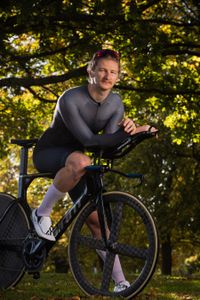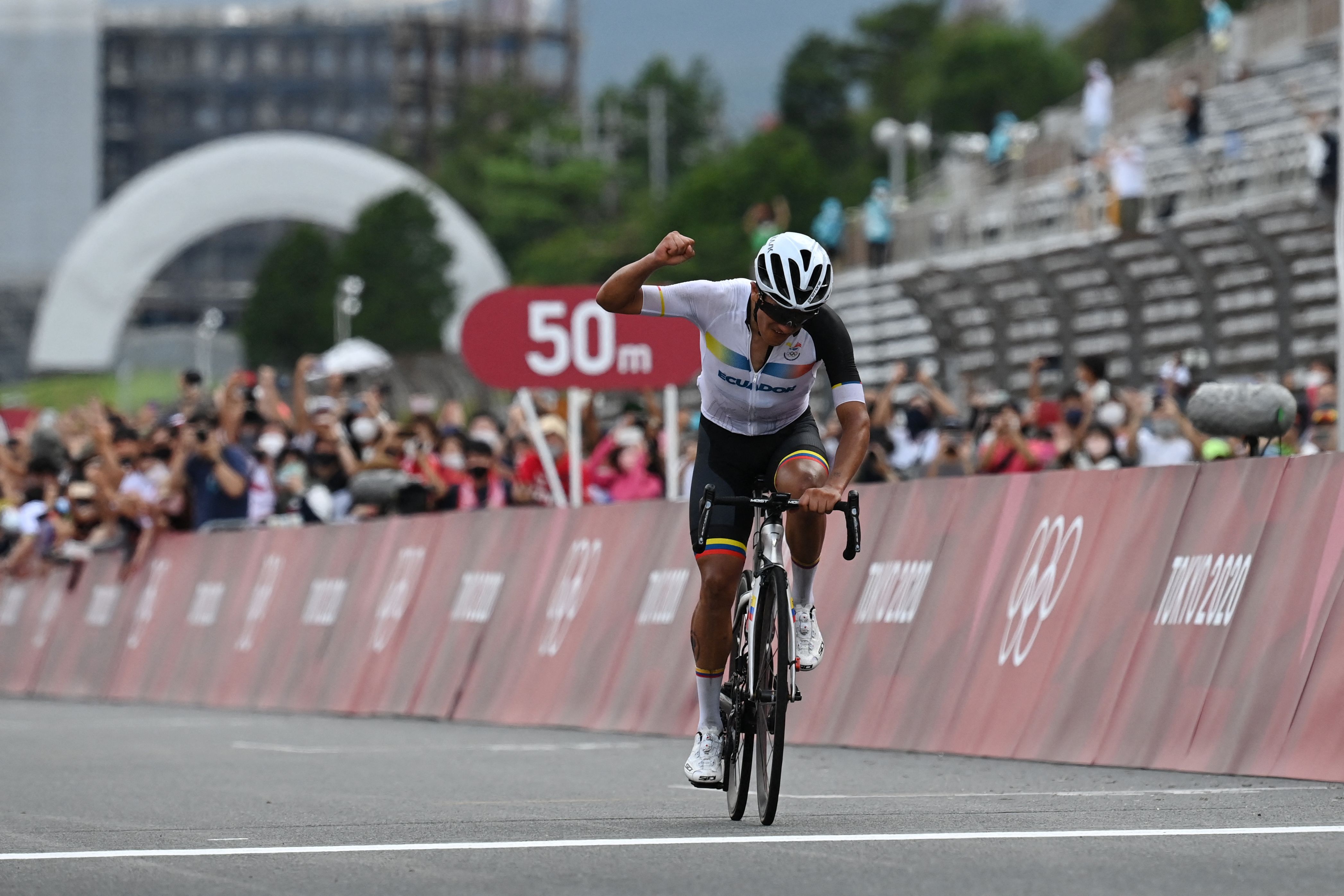Richard Carapaz storms to gold medal in Tokyo 2020 Olympics road race
The Ecuadorian put in a phenomenal ride to hold off a chasing group behind


The latest race content, interviews, features, reviews and expert buying guides, direct to your inbox!
You are now subscribed
Your newsletter sign-up was successful
Richard Carapaz put in a blistering ride to take the gold medal in the Tokyo Olympics men's road race.
The Ecuadorian held his own on the brutal decisive climb 40km from the finish, then attacking with Brandon McNulty from the USA 26km from the line.
Carapaz dropped McNulty in the final and held off a chasing group behind to take gold.
Wout van Aert (Belgium) led in the chasers to take silver, with Tadej Pogačar (Slovenia) scoring bronze.
How it happened
The Tokyo 2020 men’s Olympic road race was fought on a brutal climbing course on the slopes of Mount Fuji, south west of the Japanese capital.
Raced over 234km from Musashinonomori Park to Fuji International Speedway, featuring five categorised climbs spread through the course, the course looked like an attritional one that would be hugely impacted by the heat and humidity.
The latest race content, interviews, features, reviews and expert buying guides, direct to your inbox!

Tokyo 2020 Olympic road race route profile
The longest of the climb came 120km into the course, Fuji Sanroku, a 14km ascent with an average gradient of six per cent.
Following the descent from the mountain, riders faced an undulating 40km, before the most decisive moment of the race, the Mikuni Pass climb (6.8km at 10 per cent), which crested 30km from the finish, followed by the Kagosaka Pass (2.2km at 4.6 per cent).
After that final climb 20km from the line, the peloton then had a long descent before a mostly flat final few kilometres.
Attacks started immediately as the flag dropped, with eight riders quickly pulling out a gap to establish the day’s breakaway.
In the early stages, Belgium and Slovenia made their intentions clear by working on the front of the bunch, and it would be these two teams that would control all day.
There was a shake-up on the early climbs as three riders were dropped from the initial breakaway, leaving five out front - Nic Dlamini (RSA), Juraj Sagan (Svk), Polychronis Tzortzakis (Gre), Michael Kurkle (Cze), and Orluis Auluar (Ven).
Geraint Thomas and Tao Geoghegan Hart (Great Britain) both went down in a crash with around 150km left to race.
The break had pulled out almost 20 minutes over the peloton early on, but the gap began to tumble rapidly as the race hit Fuji Sanroku.
Reigning Olympic champion Greg Van Avermaet (Belgium) was dropped early on the climb after pulling on the front of the bunch for much of the day, as the riders began to drop out the back on the mountain, including Alejandro Valverde (Spain).
By the summit, the breakaway’s advantage had tumbled down to around five minutes, with Jan Tratnik putting in a remarkable ride in the peloton.
On the descent, plenty of riders who had initially been distanced were able to rejoin in the bunch, including Valverde, as riders approached the finish on the speedway for the first time.
As the race crossed the finish line for the first time with 60km to the finish, the leading five riders still had just four minutes’ advantage. Geraint Thomas took the opportunity to abandon after his crash earlier in the day.
The race then exploded into life, as the first attacks came from the peloton, with Remco Evenepoel (Belgium), Eddie Dunbar (Ireland) and Vincenzo Nibali (Italy) getting a modest gap on the bunch before they were eventually caught with 48km to race.
But the accelerations crushed the gap to the breakaway, as just two riders were left out front with a 50-second gap.
The Evenepoel group were caught just inside 50km from the finish, as the last of the breakaway was also swept up immediately after.
After a brief lull the race hit the decisive climb, Mikuni Pass, with some of the favourites immediately being dropped, including Tao Geoghegan Hart, Valverde and most surprisingly Remco Evenepoel.
Tadej Pogačar then launched his huge attack and was followed by Brandon McNulty (USA) and Michael Woods (Canada), with Wout Van Aert leading the chase behind.
The race came back together slightly at the top of the pass, with 11 riders forming the leading group.
Woods made his own move over the top of the climb and held a modest gap on the short descent before the plateau, with 31km left to race, but the leading group came back together again shortly after.
The decisive move then came on the final climb, the Kagosaka Pass, as McNulty and Carapaz attacked the group and almost immediately got a gap.
The chasing group then began to attack each other, with Wout van Aert doing a huge amount of work, but not being able to dent the lead of the two out front.
Adam Yates was still in that group to keep Team GB’s chance of a medal alive.
After the descent from the Kagosaka pass, the chasers did finally shorten the leash to McNulty and Carapaz down to 15 seconds, with Carapaz nervously looking over his shoulder with 6km to race.
Carapaz decided he didn’t want to lose any more time to the chasers and he attacked McNulty 5.7km from the finish, immediately dropping the American who looked to be struggling.
Behind, Van Aert continued to put in a huge chasing effort but no one was willing to work with him, so Carapaz continued to extend his advantage on his lap of the motor racing circuit.
>>> Five things to look out for at the Tokyo 2020 Olympic Games women's road race
Carapaz crossed the line to take gold for Ecuador, 1-07 ahead of the chasing group, leaving them to fight for silver and bronze.
In that group, Adam Yates launched an early sprint but never made a dent as Wout van Aert launched his effort early, powering clear before Tadej Pogačar launched his own sprint and very nearly passed Van Aert.
But it was the Belgian who took the silver medal, with Pogačar taking bronze.
Adam Yates finished ninth in that group.
Tokyo 2020 Olympics, men's road race: Musashinonomori Park to Fuji International Speedway (234km)
- Richard Carapaz (Ecu), in 6-05-26
- Wout van Aert (Bel), at 1-07
- Tadej Pogačar (Slo), at same time
- Bauke Mollema (Ned)
- Michael Woods (Can)
- Brandon McNulty (USA)
- David Gaudu (Fra)
- Rigoberto Uran (Col)
- Adam Yates (GBr)
- Max Schachmann (Ger), all at same time
Alex Ballinger is editor of BikeBiz magazine, the leading publication for the UK cycle industry, and is the former digital news editor for CyclingWeekly.com. After gaining experience in local newsrooms, national newspapers and in digital journalism, Alex found his calling in cycling, first as a reporter, then as news editor responsible for Cycling Weekly's online news output, and now as the editor of BikeBiz. Since pro cycling first captured his heart during the 2010 Tour de France (specifically the Contador-Schleck battle) Alex covered three Tours de France, multiple editions of the Tour of Britain, and the World Championships, while both writing and video presenting for Cycling Weekly. He also specialises in fitness writing, often throwing himself into the deep end to help readers improve their own power numbers. Away from the desk, Alex can be found racing time trials, riding BMX and mountain bikes, or exploring off-road on his gravel bike. He’s also an avid gamer, and can usually be found buried in an eclectic selection of books.
